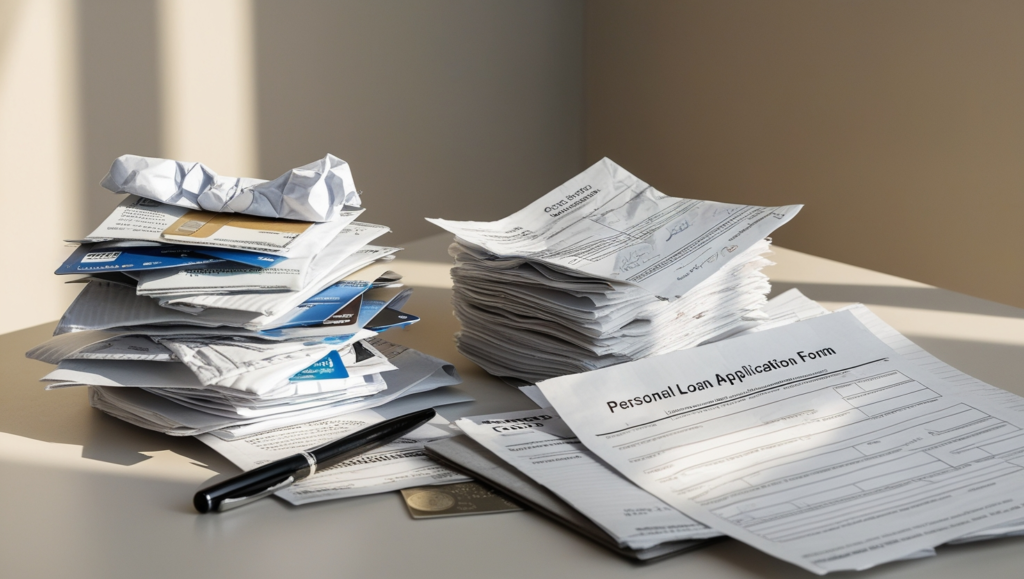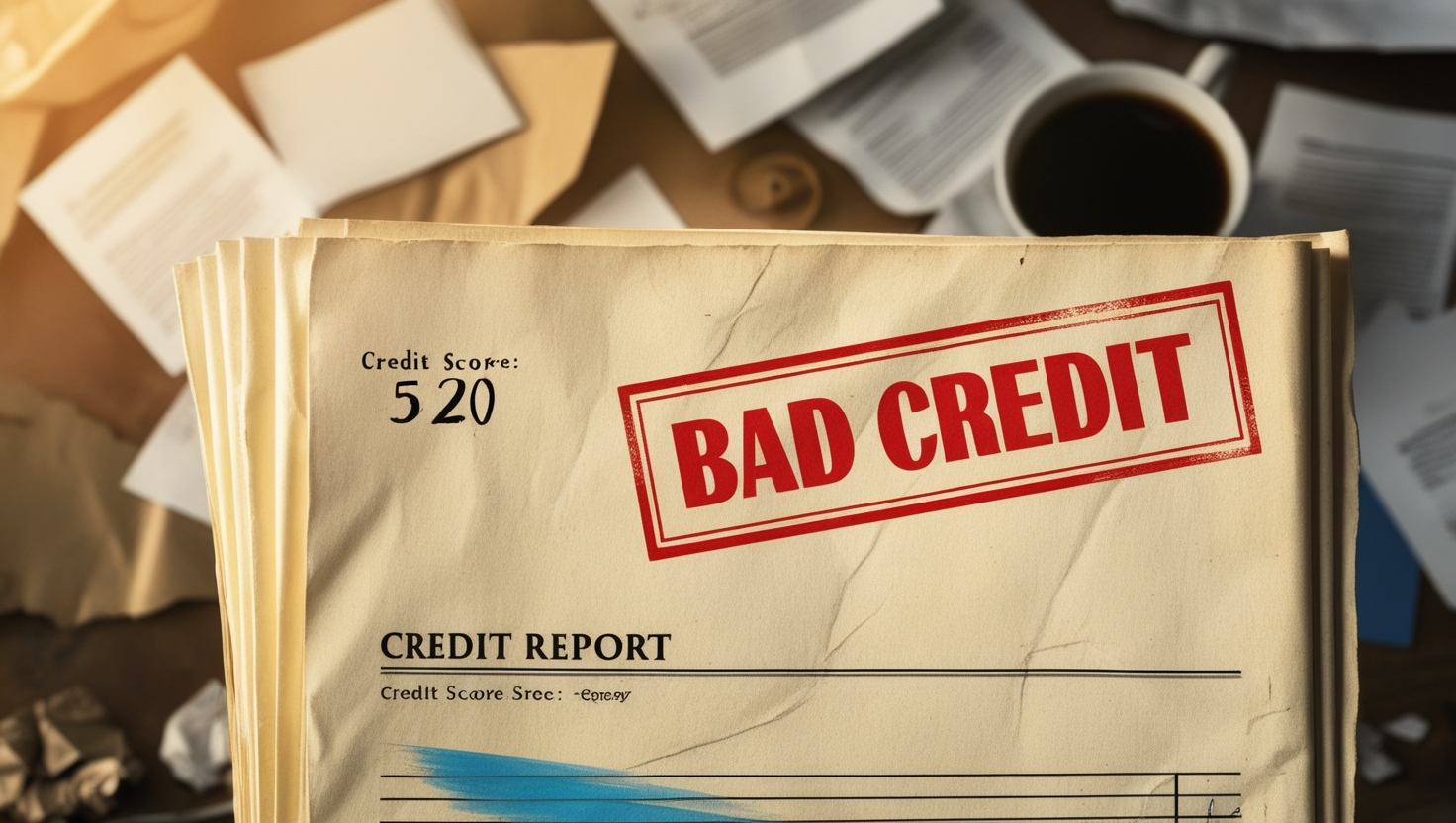A personal loan with bad credit can be a valuable tool for improving your financial situation. Whether you’re looking to consolidate high-interest debt, fund home improvements, or cover unexpected expenses, a personal loan can provide the financial relief you need. While it may be more challenging to qualify for a loan with bad credit, it’s still possible to secure favorable terms by choosing the right lender and using the funds wisely.
In this article, we’ll explore how a personal loan can help improve your finances, including ways to consolidate debt, make home repairs, and even build an emergency fund. We’ll also discuss the impact of applying for a loan on your credit score and provide tips for increasing your chances of approval. By understanding the benefits and responsibilities of borrowing, you can make a more informed decision about how a personal loan with bad credit can fit into your financial plan.
What Are Personal Loans for Bad Credit?
Personal loans for bad credit are designed for individuals with low credit scores. These loans provide a lump sum of money that borrowers can use for various purposes. Common uses include consolidating debt, making home improvements, or covering medical expenses.
These loans can be more challenging to qualify for due to the borrower’s credit history. However, they offer a valuable option for people who need financial help but may not qualify for traditional loans.
Personal loans for bad credit often come with higher interest rates. This is because lenders see the borrower as a higher risk. Despite the higher rates, these loans can provide relief in times of financial need.
Before applying, it’s important to compare loan offers and terms. This ensures you get the best deal available for your situation.
If you’re considering personal loans for bad credit, be sure to review your options carefully. Look for lenders that specialize in helping those with less-than-ideal credit scores.
For more information on how these loans work, check out this guide on bad credit loans.
Can I Get a Personal Loan with Bad Credit?
Yes, you can get a personal loan with bad credit. However, it might be more difficult compared to individuals with good credit scores. Lenders typically view borrowers with bad credit as a higher risk, so the approval process can be stricter.
Although it may be challenging, several lenders specialize in offering personal loans for bad credit. These lenders understand that not everyone has a perfect credit history and are willing to work with you. However, be prepared for higher interest rates, as this helps offset the risk for the lender.
To improve your chances of approval, consider improving your credit score before applying. Alternatively, applying with a co-signer or offering collateral can also increase your chances of securing a loan with better terms.
Best Personal Loan Options for Bad Credit
If you have bad credit and are considering a personal loan, it’s important to explore your options carefully. There are lenders who specialize in offering loans to people with poor credit histories. However, not all personal loans for bad credit are created equal. To find the best option, look for lenders that meet the following criteria:
1. Specialize in Bad Credit Loans
When searching for a personal loan with bad credit, prioritize lenders that specialize in this area. These lenders are familiar with the financial challenges that come with bad credit and can tailor loan products to suit your needs. They often take a more flexible approach to underwriting, considering factors beyond your credit score, such as income and overall financial stability.
Lenders who specialize in bad credit loans understand that traditional credit scoring models may not reflect your full financial picture. They are more likely to work with you, even if you have a lower credit score or a history of late payments.
2. Offer Flexible Loan Terms
Flexibility is another important factor when choosing a personal loan. Look for lenders that provide a variety of repayment options to fit your budget. For example, some lenders may offer loans with flexible repayment terms, allowing you to choose the duration of the loan that works best for you. This flexibility can help you manage monthly payments and reduce the risk of missing a payment.
The best personal loan options for bad credit will allow you to adjust the repayment schedule to match your financial situation. Be sure to compare different lenders to find one that offers terms you can comfortably afford. Avoid lenders with inflexible terms or short repayment periods that may put too much strain on your finances.
3. Provide Clear Terms and Conditions
Before committing to a loan, it’s crucial to fully understand the terms and conditions. This includes interest rates, fees, and the repayment schedule. Lenders who provide transparent, easy-to-understand terms will help you make an informed decision. Always read the fine print and ensure that you are aware of any potential hidden costs.
Interest rates for personal loans for bad credit can be higher than those for individuals with good credit. However, reputable lenders will clearly outline their interest rates and any other associated fees. It’s essential to understand how the loan works, including when payments are due and how much you will owe over time. Having this knowledge will help you avoid unpleasant surprises and ensure that the loan fits within your financial capabilities.
4. Have a Good Reputation
When selecting a lender, reputation matters. Be sure to choose a lender with positive reviews and a strong reputation for customer service. Check online reviews and ratings to get an idea of other borrowers’ experiences. Reputable lenders often provide responsive customer service, clear communication, and a transparent process from start to finish.
While exploring personal loan options, avoid lenders with poor reputations, as they may have hidden fees, unreasonably high interest rates, or poor customer service. Stick to well-reviewed lenders that have a track record of helping borrowers with bad credit. You can also consult trusted resources or financial experts for recommendations on reputable lenders.
5. Consider Additional Factors
In addition to the above criteria, consider other factors such as loan amounts, funding speed, and eligibility requirements. Some lenders may offer higher loan limits or faster funding, which can be beneficial if you need quick access to cash. Also, check if the lender has any specific eligibility criteria, such as minimum income or employment requirements.
Personal loans for bad credit are not always easy to find, but they can be a valuable tool when used wisely. By focusing on lenders that specialize in bad credit loans, offer flexible terms, provide clear information, and have a solid reputation, you’ll be more likely to find a loan that suits your needs.
For further guidance on choosing the right loan, check out our guide to personal loans for bad credit.

Improving Your Chances of Approval for a Personal Loan with Bad Credit
Securing a personal loan with bad credit can be difficult, but there are steps you can take to increase your chances of approval. By taking the right approach, you can improve your financial standing and make your application more attractive to lenders. Here are a few practical tips to help you get approved for a personal loan with bad credit.
1. Check Your Credit Report for Errors
One of the first steps to improving your chances of loan approval is reviewing your credit report. Sometimes, credit reports contain errors or inaccuracies that can negatively affect your score. These errors could include outdated information, wrong account details, or missed payments that were never reported correctly.
To avoid this, request a free copy of your credit report from each of the major credit bureaus (Equifax, Experian, and TransUnion). Carefully go through the report and look for any mistakes. If you find any discrepancies, dispute them with the credit bureau. Correcting errors on your credit report could boost your credit score and improve your chances of getting approved for a personal loan with bad credit.
2. Pay Your Bills on Time
Your payment history plays a significant role in determining your credit score. Lenders view a history of consistent, on-time payments as a sign of reliability and financial responsibility. Therefore, paying your bills on time can have a positive impact on your credit score.
If you’ve missed payments in the past, focus on making timely payments moving forward. Even though past missed payments may stay on your report for some time, showing that you can manage your current obligations responsibly can help improve your financial profile.
Additionally, try setting up automatic bill payments or reminders to avoid missing deadlines in the future. This simple step can help you stay on track and prevent any further damage to your credit score.
3. Consider a Cosigner
If your credit is poor, another way to improve your chances of getting approved for a personal loan is by adding a cosigner to your application. A cosigner is someone with a stronger credit history who agrees to take responsibility for the loan if you’re unable to repay it. This reduces the lender’s risk, making them more likely to approve your application.
When choosing a cosigner, ensure that the person has a good credit score and a stable financial background. Keep in mind that if you fail to make payments, the cosigner will be responsible for the debt, which could negatively affect their credit score as well.
While a cosigner can increase your chances of approval, it’s essential to have an open and honest conversation with the person you’re asking to cosign. Be sure they fully understand the risks involved before agreeing to help you.
4. Shop Around for the Best Offers
When applying for a personal loan with bad credit, it’s important to shop around and compare offers from different lenders. Different lenders may have varying requirements, loan amounts, interest rates, and terms. By comparing multiple options, you can find the best deal for your financial situation.
Online lenders, credit unions, and peer-to-peer lending platforms often specialize in offering loans to borrowers with bad credit. These lenders may offer more flexible terms than traditional banks, making it easier for you to find a loan that suits your needs. Take the time to explore your options and review all terms before making a decision.
It’s also wise to inquire about any fees associated with the loan. Some lenders charge origination fees or prepayment penalties, which can add to the overall cost of borrowing. Make sure you understand all fees involved to avoid surprises later on.
5. Consider Secured Loans
If you’re still struggling to get approved, consider applying for a secured personal loan. A secured loan requires collateral, such as a car or a savings account, which can help reduce the lender’s risk. Because of this, secured loans often have a higher approval rate for those with bad credit.
While a secured loan may be easier to obtain, it’s important to remember that if you fail to repay the loan, the lender could seize your collateral. Therefore, make sure you’re confident in your ability to repay the loan before opting for this option.
Typical Interest Rates for Bad Credit Loans
Interest rates for personal loans with bad credit are generally higher than those for borrowers with good credit. Lenders consider individuals with bad credit to be higher-risk borrowers, which is why they charge higher rates to offset this risk. The exact interest rate you will receive depends on several factors.
First, your credit score plays a significant role in determining your interest rate. Generally, the lower your score, the higher your interest rate will be. However, other factors such as your income, employment status, and debt-to-income ratio also influence the rate you’re offered. Some lenders may offer lower rates if you have a stable income or if you apply with a cosigner.
It’s important to shop around and compare rates from different lenders. Online lenders, credit unions, and peer-to-peer platforms may offer more competitive rates for people with bad credit compared to traditional banks.
Keep in mind that even with a higher interest rate, personal loans for bad credit can still be a helpful financial tool. By choosing a loan with manageable terms, you can consolidate debt or cover expenses while improving your credit score over time.

Fees Associated with Bad Credit Loans
In addition to interest rates, personal loans for bad credit may come with extra fees. Common fees include origination fees, late payment fees, and prepayment penalties. An origination fee is charged by the lender for processing the loan, and it is usually a percentage of the loan amount. Late payment fees are incurred if you miss a payment, while prepayment penalties are charged if you pay off the loan early.
Before agreeing to a loan, be sure to read the fine print carefully. Understand all associated fees, as they can significantly impact the total cost of the loan. For more information on personal loans for bad credit, check out our guide to personal loans.
Secured vs. Unsecured Personal Loans for Bad Credit
When considering a personal loan with bad credit, it’s important to understand the difference between secured and unsecured loans. Both types of loans have their pros and cons, so it’s essential to choose the one that best suits your financial situation.
Secured Loans
Secured personal loans require collateral, such as a car, savings account, or other valuable assets. By offering collateral, you reduce the lender’s risk, which often results in lower interest rates compared to unsecured loans. Because secured loans are backed by an asset, they tend to be easier to obtain for borrowers with bad credit.
However, there is a risk involved. If you default on the loan, the lender can seize your collateral to recover the amount owed. This means that if you are unable to make payments, you could lose the asset you pledged as security.
Secured loans are a good option if you need a larger loan or want to secure a lower interest rate. However, make sure you are confident in your ability to repay the loan before agreeing to it.
Unsecured Loans
Unsecured personal loans do not require any collateral. Instead, the lender relies solely on your creditworthiness, income, and financial history to determine approval and loan terms. Because they do not involve collateral, unsecured loans tend to have higher interest rates than secured loans. Lenders charge higher rates to offset the higher risk associated with lending without collateral.
While unsecured loans may be harder to qualify for with bad credit, they offer the advantage of not risking valuable assets. They can be a good option if you do not have any collateral to offer or prefer not to put your property at risk.

How Much Can You Borrow with Bad Credit?
The amount you can borrow with bad credit depends on several factors, including your income, credit history, and the lender’s policies. Generally, borrowers with bad credit are offered smaller loan amounts compared to those with good credit. Lenders may limit the loan size to reduce their risk, as a low credit score often indicates a higher likelihood of default.
Your income plays a key role in determining how much you can borrow. Lenders want to ensure that you have the ability to repay the loan, so they will assess your income and financial stability. If you have a steady job or a reliable source of income, you may be able to borrow a larger amount, even with bad credit.
It’s also important to consider the lender’s policies. Some lenders specialize in offering loans to individuals with bad credit and may be more willing to approve larger loans. However, be mindful that these loans often come with higher interest rates and fees. Be sure to carefully review the terms before accepting a loan offer.
If you are looking for a larger loan, it may be worth considering options like a secured loan, where you offer collateral in exchange for a higher borrowing limit.
Impact of Applying on Your Credit Score
When you apply for a personal loan, the lender will typically perform a hard credit inquiry. This means they will check your credit report to assess your creditworthiness. While this inquiry can cause a slight drop in your credit score, the impact is usually temporary.
If you are approved for a loan and make on-time payments, your credit score can improve over time. Consistent, responsible repayment demonstrates your ability to manage debt, which can help raise your score. However, missing payments or defaulting on the loan can cause further damage to your credit.
For more information on personal loans with bad credit, check out our guide to borrowing with bad credit.
Using a Personal Loan to Improve Your Financial Situation
A personal loan can be a powerful tool to improve your financial situation, even if you have bad credit. By using the loan wisely, you can address various financial needs, reduce debt, and set yourself up for a more stable financial future. Below are several ways a personal loan can help you improve your financial health.
1. Debt Consolidation
One of the most common uses for a personal loan is debt consolidation. If you have multiple high-interest debts, such as credit card balances or payday loans, a personal loan can help streamline your payments. By taking out a single loan with a lower interest rate, you can pay off your existing debts and consolidate them into one monthly payment.
Consolidating debt can help you save money on interest over time. Instead of juggling several different due dates and interest rates, you’ll only have to manage one loan. This can make it easier to stay on track with payments and reduce the likelihood of missing a payment. Moreover, with a lower interest rate, you may also be able to pay off your debt more quickly.
2. Home Improvement
Another way a personal loan can improve your financial situation is by financing necessary home improvements or repairs. Whether it’s fixing a leaking roof, updating an outdated kitchen, or making energy-efficient upgrades, a personal loan can give you the funds you need to make these changes.
Home improvements can increase the value of your property, which may be beneficial if you plan to sell in the future. Additionally, some improvements, like energy-efficient upgrades, can reduce your utility bills, helping you save money in the long run. A personal loan for home improvement is often more affordable than using a credit card or a home equity loan, especially for borrowers with bad credit.
3. Medical Expenses
Unexpected medical expenses can disrupt your finances, especially if you don’t have insurance coverage for certain procedures or emergencies. A personal loan can help cover medical costs that arise unexpectedly, giving you the financial flexibility to address these needs without depleting your savings.
Medical debt can be difficult to manage, and high-interest credit cards may not be the best solution. With a personal loan, you may be able to secure a lower interest rate, making it easier to manage the debt over time. By using a personal loan for medical expenses, you can take care of your health without putting your financial future at risk.
4. Emergency Funds
Life can be unpredictable, and having an emergency fund is one of the best ways to protect yourself from financial hardship. A personal loan can help you create an emergency fund if you don’t already have one. This fund can be used to cover unexpected expenses, such as car repairs, medical bills, or job loss.
Having an emergency fund provides peace of mind, knowing you won’t have to rely on credit cards or loans when an unexpected situation arises. By taking out a personal loan to establish or replenish your emergency fund, you’re setting yourself up for greater financial security in the long term.
5. Building Credit
Although it might seem counterintuitive, using a personal loan can actually help improve your credit score if you use it responsibly. If you make timely payments on the loan, it can have a positive effect on your credit score. This is especially beneficial for individuals with bad credit who want to improve their creditworthiness.
By consistently paying off your personal loan, you demonstrate to lenders that you can manage debt responsibly. Over time, this can help boost your credit score and make it easier to qualify for loans with better terms in the future.
Conclusion
However, it’s important to carefully consider your options and choose the right lender. Shop around to compare rates, terms, and fees to ensure you get the best deal possible. By using the loan responsibly, you can work towards improving your financial future and achieving greater financial stability.
A personal loan with bad credit can be an excellent way to improve your financial situation. Whether you’re consolidating debt, funding home improvements, covering medical expenses, or creating an emergency fund, a personal loan offers a flexible solution to meet your needs.
For more information on personal loans for bad credit, check out our guide to securing a personal loan.







Leave a Reply